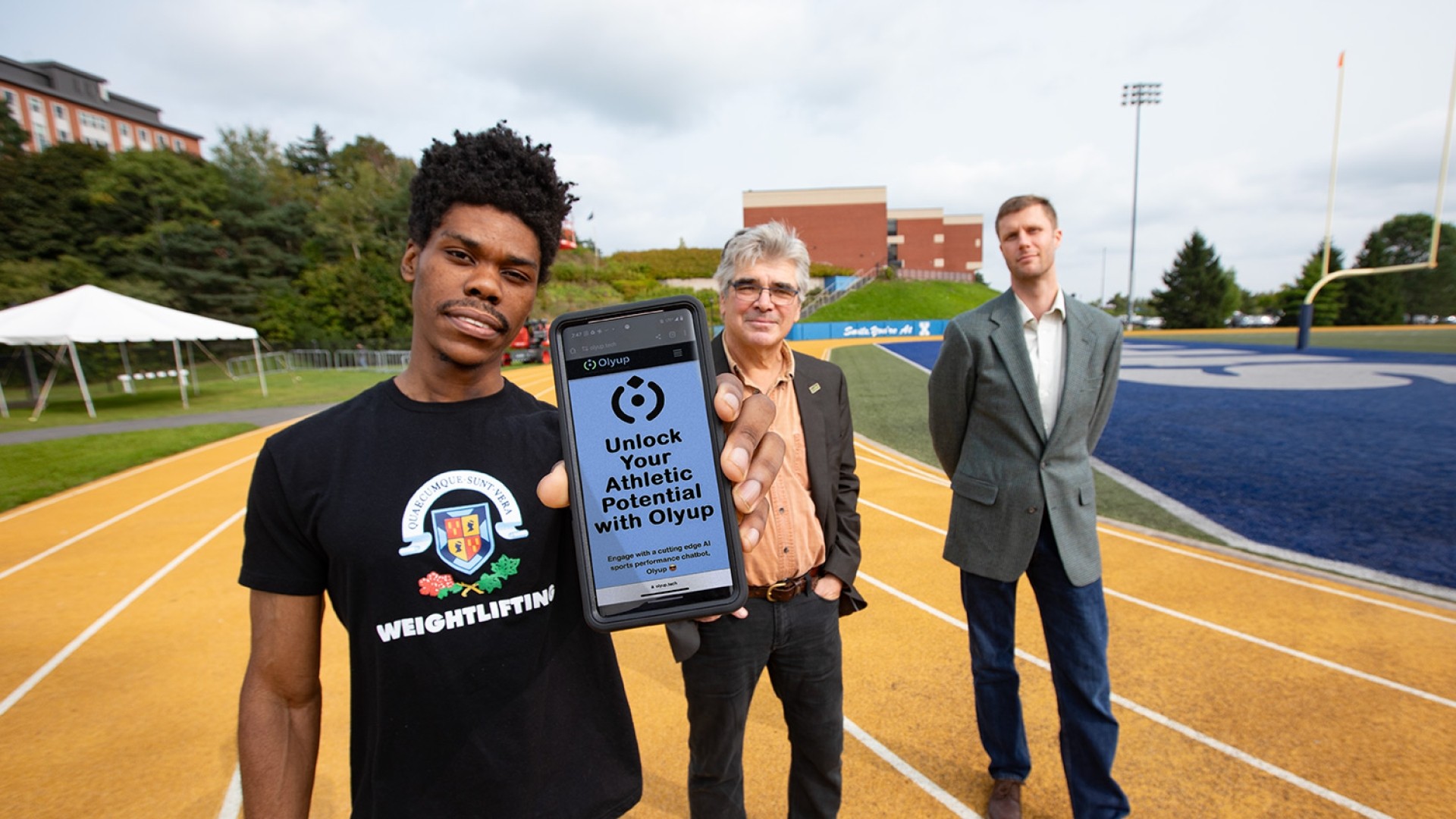
A new app that utilizes Artificial Intelligence (AI) to assist everyone in the sports performance community, from athletes and coaches, casuals, sport therapists, and nutritionists gain insights into their performance, is the result of research conducted at StFX by 2023 computer science master's graduate Mbongeni "Bo" Ndlovu.
Mr. Ndlovu, who also has a business degree from StFX, recently marked the official public beta release of Olyup, a ChatGPT application specifically designed for the sports performance community to help evaluate and optimize an athlete’s performance. The app came about thanks to his master’s research at StFX, which focused on the intersection between sports science and AI.
Mr. Ndlovu says the underlying technology used to create AI systems like ChatGPT is still quite new and across the world, people are experimenting with best practices to learn how to fully utilize this technology and build the next generation of software applications.
He saw an opportunity to create a comprehensive prototype of a custom AI Chatbot that specializes in answering questions related to sports performance for coaches and athletes.
“The idea is simple - by granting these AI models access to the athletes' or teams' historical performance data, the information is analyzed. Once analyzed, the model can address three crucial questions about their athletes or team: 1) What is their current athletic performance status? 2) What performance level do they need to achieve to become more competitive? 3) How can we help them attain their targeted performance level?”
The AI is powered by OpenAI's GPT models and connects to multiple high-quality custom data sources, made by Mr. Ndlovu, that specializes in providing the AI model with access to deep domain expertise information for answering sport performance questions.
“The AI chatbot is meant to be integrated with software applications in which sport coaches can use to keep performance records of their athletes, as well as information regarding their physical training regimen and results,” he says. “Coaches and athletes alike can ask questions about their performance standings and seek AI strategies on how to improve in their sport and become more competitive.”
Mr. Ndlovu says AI systems like ChatGPT typically struggle to answer questions related to sport performance. Whether it's about an athlete's performance, generating training program strategies or coming up with new tactical play strategies on the field against your opponents, these AI systems perform poorly in this domain. He says it quickly became apparent after the introduction of AI systems like ChatGPT in November 2022 that Olyup could enhance their sports performance capabilities by leveraging the research projects they conducted over the past four years.
The challenge lies in adapting and modifying these research projects for AI systems, rather than solely focusing on human use. By tailoring them specifically for AI systems, their ability to answer sport performance-related questions can be significantly improved. This, in turn, benefits coaches and athletes by providing them with more effective answers to enhance their athletic potential, he says.
He says his background as an intern in strength and conditioning, as well as an Olympic weightlifting coach, has deeply connected him to this project. “It's shown me firsthand how tech like ChatGPT can really help the sports performance community,” he says.
“From what I've observed, using this technology can boost everyone's productivity by roughly 30 per cent. So, it's not just about achieving goals faster, but also about getting more done with the time you have.”
The sports world is often slow to embrace new things, and he says he was the same way until last December when he started to see real benefits after developing the first version of Olyup.
“We all face challenges, and this tech can help,” he says. “You can turn any problem into a question and get quick answers from these AI systems. The faster you get answers, the more time you save.”
Olyup, he says, isn’t just an app; it's the culmination of sleepless nights, relentless grind, and every obstacle he's battled through. "It's more than code and data—it's a testament to my journey, every hurdle faced, every setback turned comeback. It embodies my belief that through sheer will and grit, we can redefine the limits of what's possible in sports performance. For every athlete, coach, or individual out there striving for excellence, Olyup is my way of saying 'I got your back, let's conquer this together.'"
Mr. Ndlovu says he is thankful for his supervisor, StFX computer science professor, Dr. James Hughes, and his co-supervisor, StFX Gerald Schwartz School of Business faculty David Mattie, for their academic mentorship. He also appreciates the business acumen and intellectual property advice provided by StFX Manager of Industry Liaison and Technology Transfer, and Springboard Atlantic representative Andrew Kendall. Additionally, he wishes to acknowledge the invaluable experience and insights gained from coaching Olympic weightlifters throughout his master's research, emphasizing how integral they've been to his journey.
He also thanked OpenAI. “Launching ChatGPT last year was a game-changer for my research,” he says. “It made me see that Natural Language Processing was the missing piece I'd been looking for. I'm now shifting much of my work to focus on this area. It's becoming clear that getting computers to understand and speak our language is a huge step forward.”
He also sent special thanks out to Mitacs, a funding agency that supports student entrepreneurs and researchers, and an agency that has twice awarded him funding grants. “Your support since 2020 has been invaluable. Without you, Olyup and all the research I have done in the intersection between sports science and Artificial Intelligence would not be where it is today.”

